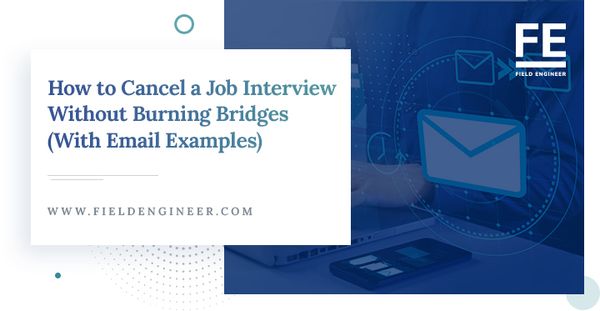How to Cancel a Job Interview Without Burning Bridges (With Email Examples)
Learn how to cancel a job interview gracefully and professionally in our article. Discover valuable tips and email examples to navigate this uncomfortable situation carefully and maintain your professional reputation.
Have you ever found yourself in a situation where you needed to cancel an interview? Perhaps something unexpected arose, or you realized the job didn't fit you. Whatever the reason, handling the cancellation professionally and respectfully is important. Knowing how to cancel an interview properly can save you from burning bridges and maintain your professional reputation.
Job interviews are crucial in the hiring process, and canceling one can be tricky. It's important to handle it with care to avoid any negative consequences. Knowing the right way to do it is essential whether you're canceling for personal reasons or a change in circumstances.
Canceling an interview can be uncomfortable, but it doesn't have to be daunting. You can navigate this situation gracefully and professionally by following proper etiquette and using the right email examples. In this article, we will provide valuable tips on how to cancel an interview effectively, along with email examples to guide you through the process.
Is Cancelling an Interview Considered Unprofessional?
Canceling job interviews is not only acceptable but often necessary for a variety of reasons. For instance, family emergencies may arise, and you must take care of them. Car troubles may arise, and you can't make it on time, or perhaps the company has taken too long to respond to an applicant's questions about the role or given too few details about the position. Additionally, suppose an applicant receives another offer or no longer feels comfortable with the opportunity for any reason at all. In that case, they should feel able to turn down an invitation for an interview.
Though canceling an interview is understandable, candidates must practice proper etiquette by providing as much notice as possible so their would-be employers are prepared and not left in a difficult situation. People shouldn't assume that the hiring team will know why they're not showing up; instead, provide a brief explanation (even if vague) as soon as possible so that companies know about your absence. It's also important to reflect on feedback from canceled interviews to improve interview techniques for future positions. While canceling interviews may seem unprofessional and upsetting, it might be just what someone needs when needed most.
When Interview Cancellation Is Necessary
There are many different reasons why canceling an interview may be necessary. For example, if you're experiencing a personal crisis and can’t focus on the task at hand, you should consider notifying the hiring manager so that they understand the situation. Additionally, unexpected events might cause you to have to cancel interviews as well. If your child gets sick or you acquire an unexpected project at work, these are valid reasons to cancel your interview.
Hiring managers and interviewers understand that not everything can be predicted. They want you to show up prepared and ready for the interview, but they would rather you reschedule than come unprepared. So if something comes up where rescheduling isn't possible or doesn’t make sense in either yourself or the interviewer's timeline, it's okay to politely and professionally explain the situation and cancel the meeting. As long as you communicate respectfully, canceling an interview isn't unacceptable in most cases; it just signals that now is not a good time for this particular conversation.
Tips on How to Cancel a Job Interview by Phone or Email
Here are a few tips to keep in mind when sending an email to cancel an interview:
Notify interviewers at your earliest convenience
It is important to inform your interviewers as soon as you know you need to cancel an interview. Not only is it the polite thing to do, but it also keeps them from wasting their time and energy when they find out you won't be showing up. If the company has requested that you commit to a specific date in advance, make sure to contact them immediately so they can plan something else in your spot. Respect and courtesy should always be honored, even when canceling something as formal and important as an interview.
Besides presenting yourself well by being timely and communicating quickly, it is also courteous to apologize for needing to reschedule your meeting at this late notice. That way, the employer has a good impression of you despite not meeting face-to-face during the initial meeting time. You may also want to inquire if any other dates or times are available so that you don’t miss out on the opportunity to interview with them completely. Showing respect for someone else's time will help build relationships for future encounters.
Keep the option open for rescheduling
If you find yourself in a situation where rescheduling an already planned job interview is necessary, it's important to communicate with your interviewer. Proactivity can be essential for a good impression, and sending a message explaining the need for change means the employer will be aware of the issue. Even if there are only potential circumstances arising that could end up requiring a date change, it’s best not to wait until the last minute – if changes do arise and there is no prior communication about them, the interviewer may be considerably more displeased.
Letting an employer know kindly of any potential delays has a positive side, too, as it allows them plenty of time to plan accordingly and alert their team of any forthcoming alterations. It demonstrates responsibility and understanding on behalf of you - the applicant - that such advanced notice can help the organization plan their schedule; in addition to that, such polite behavior leaves your name positively in their minds regardless of whether or not they rebook an alternative day for interviewing you.
Keep your reason concise
If you ever find yourself needing to cancel an interview, it is important to be brief and honest. Being honest about why you can’t attend the interview will give the employer an understanding of your circumstances and help them be more accommodating. For example, suppose you have come down with a sudden illness like strep throat or have had to travel due to a sudden family emergency such as the death of a close relative. In that case, these are both acceptable reasons for canceling an interview.
It might be hard to tell someone you canceled at the last minute. But being honest upfront will make it easier for both parties involved and demonstrate your commitment to professionalism. In some cases, canceling well before the interview date allows another candidate to fill the spot and prevents any kind of miscommunication between both sides. It also shows respect, knowing they could have already assigned tasks and plans accordingly depending on the interview's schedule.
Maintain a respectful tone in your conversation
It is important to be polite when canceling an interview, as you never know when you may require the company's or individual's services in the future. Being rude and burning bridges can lead to closed doors and limited opportunities, so it’s always best to remain courteous throughout all forms of communication.
When canceling an interview, one should make sure that they are courteous and respectful on a call or while writing emails. When communicating over the phone, introduce yourself again and give your regrets as well as an explanation for why you are unable to attend. If sending an email, it’s best to reiterate your regret and explain why you won’t be able to come for the next round of interviews. It is also important to be sincere in your expressions to not appear insincere or unknowledgeable about how these things work. One must remember that being polite goes a long way!
Outline the Interview Details
Interviews are an important step in the job hiring process, and candidates should always make sure to pay close attention to the details. Before any interview, it is essential to understand what job title and position you are interviewing for to prepare properly.
When canceling an interview, it is also crucial that you include both of these pieces of information; failing to do so may cause confusion and delay within the HR department. By including your job title and your scheduled day/time for the meeting, you help ensure that all affected departments and personnel know that you cannot attend your proposed interview. It is common courtesy and necessary if you want your cancellation request to be processed quickly without further complications.
Apologize interviewer for any inconvenience caused
When canceling an interview, it is important to apologize for any inconvenience caused and to express your understanding of the interviewer's time. This can help maintain a positive relationship with the interviewer.
"I am sorry for canceling the interview and any inconvenience that it might have caused. I understand the interviewer must have taken time to talk to me, and I appreciate their effort. I sincerely apologize for wasting your time and any other resources that were utilized in anticipation of my attendance.
I regret that the circumstances prevented me from attending, and if you are interested in hiring me for the job opportunity, I would be happy to reschedule an interview at your earliest convenience. I understand how valuable your time is, and I promise to arrive on time with a thorough understanding of what is expected of me during the interview. Once again, I apologize for being unable to make it to our scheduled appointment."
How to Cancel an Interview: Sample Email Templates
Example - How to Cancel an Interview: When You Got a Job/ Other Offer
Dear [Interviewer Name],
I am writing to inform you of my need to cancel my interview on [date] for the [position] at [company name]. After much consideration, I have accepted another offer of employment at [company name], and am no longer available for your position.
I am deeply humbled and grateful that you chose to consider me for this opportunity, and I apologize for causing any inconvenience or disruption. Though my circumstances have changed, I remain thankful for your kind offer. Please accept my sincerest apologies for having to back out of this interview. Once again, thank you so much for this opportunity.
Sincerely,
[Your Name]
Example 2- How to Cancel an Interview Without Burning Bridges
Dear [Interviewer Name],
I understand that your time is valuable, and I apologize for any inconvenience this may have caused. I am truly grateful for the opportunity to interview with [company] and further explore my qualifications for the [role].
Respecting your time is important to me, so please accept my sincere apologies. Should an opportunity arise for another interview, I would love to revisit our connection and potentially continue exploring a potential working relationship. I wish you and [company] success moving forward as you continue your hiring process.
I understand that bridging relationships is invaluable throughout the job search process; thus, I hope canceling my interview does not create a barrier of trust between us. I appreciate your communication and understanding during this difficult situation. If you need references regarding my qualifications or more information about my background, please do not hesitate to contact me at [your contact information].
Again, thank you for the invitation to interview for this position; please accept my apologies for not being able to attend on the proposed date.
Sincerely yours,
[Your Name]
Conclusion
It is important to avoid canceling an interview unless absolutely necessary, as employers will likely consider it unprofessional and disrespectful. Unless something unexpected comes up, such as a family emergency or illness, you should ensure you still attend the interview when given the opportunity. In these situations, you must inform the employer quickly and apologize for the inconvenience instead of no-showing. This allows them to fill your spot if need be while still maintaining some goodwill between both parties.
If you must reschedule an interview, be upfront about why and provide as much information as possible so the employer knows what to expect on the new date. Even if they understand your situation, try to grant them some time to prepare for your 'makeup' appointment - at least one week should suffice. After all, not every company has jobs available all year round - missing this opportunity could mean waiting until their hiring process opens again for a chance at employment.







